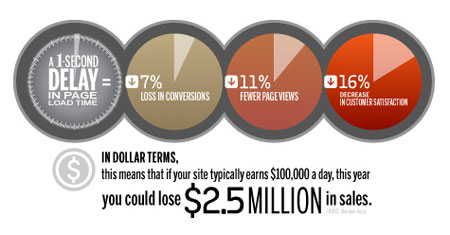Nobody likes a slow website. You've got stuff to do, and not a lot of time to do it. Slow websites are inconvenient.
It's easy to look at other websites and complain about how sluggish they are. But have you ever stopped to think about how your company website stacks up?
Website speed seems pretty trivial, at first. Who's really timing how fast a page loads? And waiting an extra second or two, it's not really that bad, is it?
You'd be surprised. From negative brand perception to thousands of dollars in lost sales, the consequences are serious. A slow website isn't just annoying -- it's bad for business.
Customers Want Your Website To Be Fast
A fast-loading site isn't a luxury; it's a necessity. Customers expect a website to load in 2 seconds, max.
And if customers think your site is slow, watch out! Research shows that if a site takes longer than 3 seconds to load:
- 57% of prospects will abandon the site and go elsewhere to find an answer or buy a product.
- 80% of people will never return to the site. And of that 80%, half will also tell their friends, family members, co-workers and other about their negative experience.
A slow website can potentially damage your reputation and cost you new business.
Google Wants Your Website To Be Fast
Google includes site speed and load times as a factor in its search ranking formula. Though they try to downplay its significance (it's not as important as, say, crafting unique, relevant content), site speed can potentially have a big impact on your website's search engine ranking.
By optimizing website load times, REI saw a 50% decrease in the time it took Google to crawl a page...and a +100% increase in the number of pages Google crawled each day!
A fast site means that Google can crawl pages more quickly, which means more pages can get crawled in a day. The more pages Google crawls, the more content you have stored in Google's massive library of resources. The more content you have stored, the more opportunities you have to get found by and connect with potential buyers.
Your Sales Team Wants Your Website To Be Fast
A slow site won't make you lose favor with customers or search engines alone. Your website could be a sore spot for the sales department, too.
This data from an Strangeloop shows that delays in website load time can lower customer satisfaction, decrease pageviews, and hurt your conversion rate, all factors that can have a negative impact on your sales.
Ultimately, your website's poor performance can cost you big bucks. Can you afford to lose hundreds, thousands, or even millions of dollars?

A slow website can have a catastrophic impact on your sales.
A Fast Website Improves Your Bottom Line
Shopzilla decreased average web page load time from 7 seconds to 2 seconds. That 5-second improvement made quite the difference. Shopzilla saw that:
A Fast Site Increases Sales Opportunities
Speeding up their site resulted in a 25% increase in pageviews.
The more pages a visitor sees, the more content they consume. The more content they consume, the more opportunities you have to convert them into buyers.
A Fast Site Increases Revenue
Shopzilla saw a 7-12% increase in revenue after they made their website load faster.
Enhancing website performance puts more money in the bank.
A Fast Site Lowers Operating Costs
The company experienced a 50% decrease in overhead.
Shopzilla got to live every business owner's dream: increasing revenue AND decreasing operating costs. At the same time!
Optimizing your website's load time can have surprising benefits, from SEO improvements to better profit margins. Do you think about website speed when it comes to marketing and sales? Will you think twice about how you measure and evaluate your website's effectiveness?









